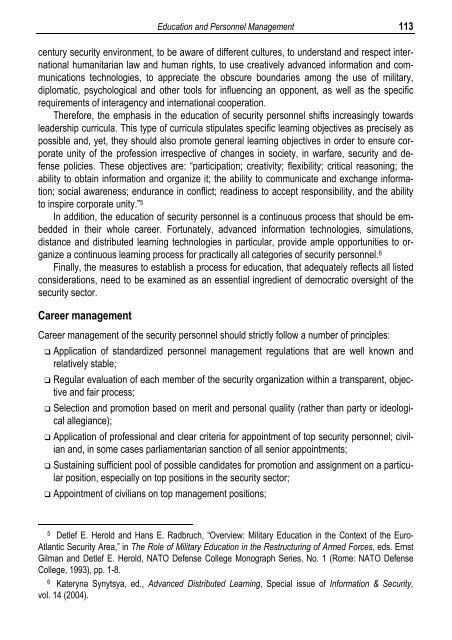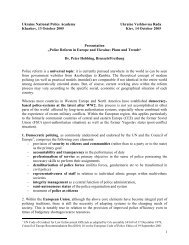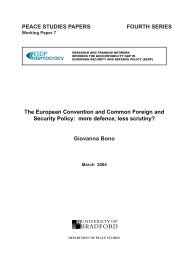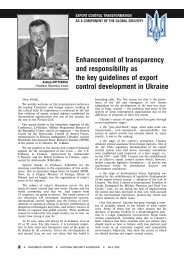Civil-Military Relations and Democratic Control of the Security Sector
Civil-Military Relations and Democratic Control of the Security Sector
Civil-Military Relations and Democratic Control of the Security Sector
You also want an ePaper? Increase the reach of your titles
YUMPU automatically turns print PDFs into web optimized ePapers that Google loves.
Education <strong>and</strong> Personnel Management<br />
century security environment, to be aware <strong>of</strong> different cultures, to underst<strong>and</strong> <strong>and</strong> respect international<br />
humanitarian law <strong>and</strong> human rights, to use creatively advanced information <strong>and</strong> communications<br />
technologies, to appreciate <strong>the</strong> obscure boundaries among <strong>the</strong> use <strong>of</strong> military,<br />
diplomatic, psychological <strong>and</strong> o<strong>the</strong>r tools for influencing an opponent, as well as <strong>the</strong> specific<br />
requirements <strong>of</strong> interagency <strong>and</strong> international cooperation.<br />
Therefore, <strong>the</strong> emphasis in <strong>the</strong> education <strong>of</strong> security personnel shifts increasingly towards<br />
leadership curricula. This type <strong>of</strong> curricula stipulates specific learning objectives as precisely as<br />
possible <strong>and</strong>, yet, <strong>the</strong>y should also promote general learning objectives in order to ensure corporate<br />
unity <strong>of</strong> <strong>the</strong> pr<strong>of</strong>ession irrespective <strong>of</strong> changes in society, in warfare, security <strong>and</strong> defense<br />
policies. These objectives are: “participation; creativity; flexibility; critical reasoning; <strong>the</strong><br />
ability to obtain information <strong>and</strong> organize it; <strong>the</strong> ability to communicate <strong>and</strong> exchange information;<br />
social awareness; endurance in conflict; readiness to accept responsibility, <strong>and</strong> <strong>the</strong> ability<br />
to inspire corporate unity.” 5<br />
In addition, <strong>the</strong> education <strong>of</strong> security personnel is a continuous process that should be embedded<br />
in <strong>the</strong>ir whole career. Fortunately, advanced information technologies, simulations,<br />
distance <strong>and</strong> distributed learning technologies in particular, provide ample opportunities to organize<br />
a continuous learning process for practically all categories <strong>of</strong> security personnel. 6<br />
Finally, <strong>the</strong> measures to establish a process for education, that adequately reflects all listed<br />
considerations, need to be examined as an essential ingredient <strong>of</strong> democratic oversight <strong>of</strong> <strong>the</strong><br />
security sector.<br />
Career management<br />
Career management <strong>of</strong> <strong>the</strong> security personnel should strictly follow a number <strong>of</strong> principles:<br />
Application <strong>of</strong> st<strong>and</strong>ardized personnel management regulations that are well known <strong>and</strong><br />
relatively stable;<br />
Regular evaluation <strong>of</strong> each member <strong>of</strong> <strong>the</strong> security organization within a transparent, objective<br />
<strong>and</strong> fair process;<br />
Selection <strong>and</strong> promotion based on merit <strong>and</strong> personal quality (ra<strong>the</strong>r than party or ideological<br />
allegiance);<br />
Application <strong>of</strong> pr<strong>of</strong>essional <strong>and</strong> clear criteria for appointment <strong>of</strong> top security personnel; civilian<br />
<strong>and</strong>, in some cases parliamentarian sanction <strong>of</strong> all senior appointments;<br />
Sustaining sufficient pool <strong>of</strong> possible c<strong>and</strong>idates for promotion <strong>and</strong> assignment on a particular<br />
position, especially on top positions in <strong>the</strong> security sector;<br />
Appointment <strong>of</strong> civilians on top management positions;<br />
5 Detlef E. Herold <strong>and</strong> Hans E. Radbruch, “Overview: <strong>Military</strong> Education in <strong>the</strong> Context <strong>of</strong> <strong>the</strong> Euro-<br />
Atlantic <strong>Security</strong> Area,” in The Role <strong>of</strong> <strong>Military</strong> Education in <strong>the</strong> Restructuring <strong>of</strong> Armed Forces, eds. Ernst<br />
Gilman <strong>and</strong> Detlef E. Herold, NATO Defense College Monograph Series, No. 1 (Rome: NATO Defense<br />
College, 1993), pp. 1-8.<br />
6 Kateryna Synytsya, ed., Advanced Distributed Learning, Special issue <strong>of</strong> Information & <strong>Security</strong>,<br />
vol. 14 (2004).<br />
113

















